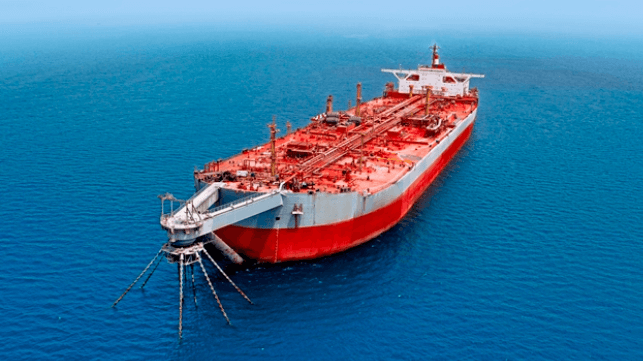Greenpeace: FSO Safer Poses a Bigger Threat Than Previously Believed

A new study produced by Greenpeace suggests that the decaying Yemeni FSO Safer may pose a bigger threat to the Red Sea's fisheries and shorelines than previously believed.
The FSO Safer is a converted single-hull tanker, and she is permanently moored as a floating storage facility off the coast of Yemen. The vessel has been sitting unmaintained with over 1.1 million barrels of light crude oil on board since the outbreak of the Yemeni Civil War seven years ago.
According to UN experts and NGOs, the the vessel is at risk of exploding or spilling its oil cargo. Its inerting system has not been run in some time, and its generators are offline. Photos taken on board the vessel show extensive signs of corrosion.
Negotiations between UN representatives and the Houthi rebels who control northwestern Yemen have not yet led to an agreement to secure the cargo and the ship. If the parties do not decide on a solution, and the vessel sinks, the resulting oil release could be up to four times as large as the spill from the Exxon Valdez.
According to Greenpeace's new study, modeling shows that a spill of this magnitude could affect the desalination water supply for the entire Red Sea region within three weeks of a spill. The nearest plants are at Hodeidah, Salif and Aden, and if they were interrupted by oil contamination, it would affect the drinking water supply for about 10 million people. It could also interrupt access at the port of Hodeidah, a key gateway for food and aid supplies, and it would likely close Yemeni fisheries, which support 1.7 million people.
According to Greenpeace, an oil containment boom should be deployed around the Safer as a precautionary measure, even if the removal of the oil from the vessel is the only genuine solution to the threat. So far, this option has been blocked by Houthi leaders, who have expressed distrust for the United Nations.
“We accept that there are big challenges in removing the oil securely from the Safer, but the barriers to undertaking this are not technical but political. The technology and expertise to transfer the oil to other tankers exist, but despite months of negotiations we are still at a stalemate and the Safer remains in its ever-deteriorating state," said Paul Horsman, Project Lead Safer Response Team at Greenpeace International.
Greenpeace called for Western governments to send spill-response assets to station on standby near the Safer, and it encouraged the parties to the discussion to find a solution that would allow the vessel to be lightered.
